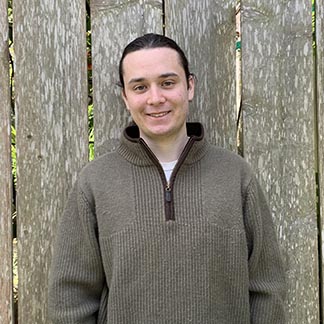Campus News
Max Tarlov
Max Tarlov, 21, already had his major in mind when he started out at UC Santa Cruz. But a class called Syntax 1 deepened his engagement with linguistics, while helping him to develop critical thinking skills.

Max Tarlov, 21, already had his major in mind when he started out at UC Santa Cruz. But a class called Syntax 1 deepened his engagement with linguistics, while helping him to develop critical thinking skills.
That course was a game changer for Tarlov, who was honored with an Undergraduate Research Fellowship for his research project entitled, “Properties of Alignment and Match Theories in Kinyambo.” His research focuses on using intonation data from a Bantu language called Kinyambo to make predictions about how intonation can work across the world’s languages.
In the Syntax 1 class, students were given problem sets three times a week and simply asked to provide an analysis of the data they were given.
“The problem sets were graded on the quality of the argumentation, not correctness, because it quickly becomes clear that there is no consensus regarding the correct answer for most of these problems,” Tarlov said. “Syntax 1 taught me to think critically about linguistics, how to come to my own conclusions, and how to question my own thinking.”
That class established a strong foundation for his other linguistics classes at UC Santa Cruz. He also had the opportunity to work as a research assistant on a program called SPOT (Syntax-Prosody in Optimality Theory). Through this program, he learned a lot about software development in the service of linguistics research.
His time at UC Santa Cruz has had a lasting impact.
“I think that when I entered the program, I wanted to be someone who knew things about linguistics, but leaving the program I think of myself as someone who understands things about language,” Tarlov said. “Learning to think critically about other people’s interpretations of data and thinking critically about my own interpretations of linguistic data have allowed me to understand why we conduct linguistic research and how much there still is to learn about human language.”